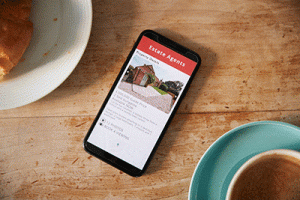Real Estate Apps Overview Page
Buying or selling a home can be downright scary. While it shouldn’t cause you pain or leave you trembling from anxiety, the fact is that buying or selling a house can be overwhelming. That’s true even if you’ve done it before. For first time buyers, it can be hard to even know where to begin.
Real estate tools and apps can help you through the process. Use this guide to learn more about the pros and cons of real estate apps and how they can help you find the right home or sell your existing property.
The Exciting, Terrifying Prospect of House Hunting
The initial search part of buying a home like choosing your ideal location and setting your must-have list can be fun. Once you start adding your budget, dealing with schools, zoning, and repairs, the process gets a lot more difficult.
Technical things like getting a loan, choosing an escrow-type, or knowing what to pay for a house make it even harder. Real estate apps aim to make the whole process much simpler by providing listings, estimates, and information about an area.
Some apps even work with buyers to make the actual payment process easier, from getting pre-approved to a loan to making an offer.

What Is a Real Estate App?
A real estate app is a tool you can have on your phone, tablet, or computer to help you buy or sell a home. Many of today’s most popular apps started as websites, such as Zillow and Realtor.com, some of which may still be more operational with extra features not available through the app.
Every app varies, but people tend to use these apps to search listings and find out what is available in their area when they’re ready to buy or sell a home. Apps are also helpful for getting the asking price of a home, finding information about the history of the house, and learning more about the neighborhood.
Some apps allow you to buy or sell through their service, which can in some cases simplify the process.
Pros and Cons of Using a Real Estate App
The main benefit of using a real estate app today is the fact that you’ll get to see a greater number of listings in short order. You’ll also get a better understanding of different neighborhoods and general home values. Using a real estate app early on can also help you set your budget if you’re somewhat flexible.
There are few cons for potential buyers as long as you’re vigilant and verify all information provided by the app. You’ll also want to double-check that pricing is fair before making an offer of any kind. The same is true of inspection data.
For sellers, real estate apps help you reach more buyers than ever before. They do this with a commission or fee in mind though, so the trade-off is that you have to pay for this new reach. For many sellers and realtors though, this is a small price to pay for marketing a home to a wide audience of potential buyers.
Should I Also Hire a Realtor?
In general, having a qualified realtor on your team will always be helpful, especially if you’re buying a home and you aren’t sure of the market. Your realtor will help do the legwork of finding the right home, but more importantly, they can help you through the inspection phase and make sure you don’t pay a penny over market value.
For sellers, it really depends on your experience and comfort level. You’ll save money without a dedicated realtor, but the process will likely be more complicated for you.
Must-Have Features for Any Real Estate App
Every real estate app is a little different, and what you need may vary from what will work for other people. In general, detailed listings are helpful for everybody, helping you get the lay of the land on any property before you even take time to see it in person. Here are a few other helpful features many real estate apps offer:
• Filtered search listings. These are helpful if you have certain criteria you need to meet when shopping for a home.
• Detailed photos of the property. Clear, professional photos are also helpful for many potential buyers.
• A rundown of nearby attractions, facilities, and transportation options. You may also want to know about religious organizations, hospitals, and access to shopping, restaurants, and parks.
• 360 virtual tours. Virtual tours allow you to navigate your way through a home without seeing it in person. This is helpful if you’re looking for a home out of your city or state, but can help you narrow down options to view in person even within your area.
• Video tours. Seeing a video tour of a home can help you find out if you’d like to view it in person. Most real estate apps and sites offer video tours.
• Past pricing information and market predictions. While pricing information can be old or out-of-date, estimates provided by real estate apps can be valuable. They can also help you predict the market in the future to help you choose the right time to buy.
Real estate apps can be incredibly helpful when you’re buying or selling a property. They aren’t necessarily a total solution, however, particularly if you’re dealing with an unfamiliar market or you have no past experience.
Still, apps can be helpful in your search for the right home. They can also make selling simpler and faster even if you’re working with a realtor.
In short, real estate apps are must-have tools in today’s tech-driven world. Without them, you’ll be missing at least part of the picture when it comes to buying or selling a home.
Advertising Disclosure: This post may contain promotional links. Watch the Review may be compensated if you use these links.







